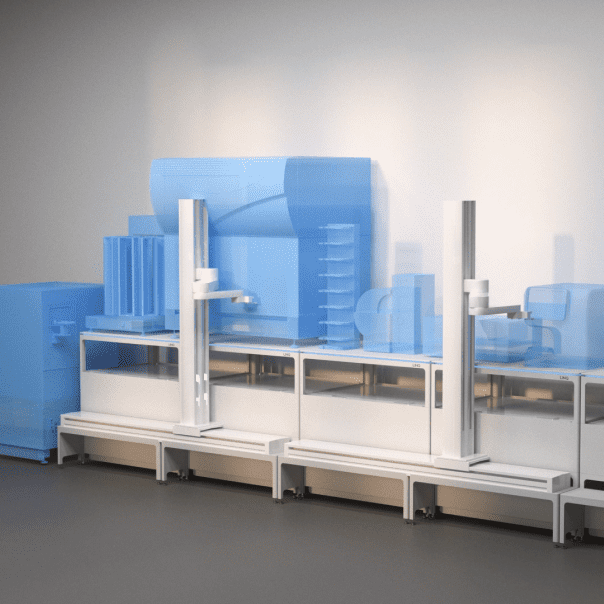
As first featured in Scientist Live
The power of automation by Kathryn Golden
This article was first featured on scientistlive.com. Read more about Automata’s partnership with bit.bio here.
Kathryn Golden on unlocking scientific innovation with automation
Historically, many scientific breakthroughs come from a small team of scientists. These breakthroughs are often just the first steps of great innovation and when it comes to global industrial implementation, an enormous scale-up and capacity increase is required to meet the potential of the breakthrough.
Although businesses can increase capacity by taking on new staff or increasing the number of lab benches within the space available, this is often done in a reactive manner, and doesn’t consider additional growth in the future. This approach limits science companies to incremental growth, and costly re-organisation of benches and labs each time capacity increase is required.
Technological advancement has the power to re-shape entire industries and businesses must embrace these changes to remain at the forefront of their fields. Automation is one concept well established in manufacturing, but its applications within R&D and scientific discovery are only recently being harnessed.
I oversee technical operations and cell manufacturing at bit.bio – a synthetic biology company that provides human cells for research, drug discovery and cell therapies. Our opti-ox technology induces the expression of transcription factor combinations that reprogram induced Pluripotent Stem Cells (iPSCs) into defined human cell types with unrivalled consistency – this means huge potential for limitless scale-up.
The business originally spun out of Cambridge University in 2016 and since then it has grown rapidly. This growth has manifested in increased requirements for staff and lab space, and an increase in the variety of bench and computational research taking place at the company.
In the medium term, bit.bio hopes to enable cell therapies, which use human cells to treat a range of issues, from current applications in some cancers to potential applications in dementia and Parkinson’s disease in the future. Innovation and roll-out in this field requires a consistent supply of human cells for researchers and clinicians far beyond the supply required at the initial research phase, and therefore our manufacturing capability will also be required to scale and grow in line with these ambitions.
Automating some aspects of our work has already enabled the team to greatly improve the capacity of production of human cells. Going forward, this will allow scientists to focus more on impactful science and innovation, leaving repetitive manual tasks to automation. To achieve this, we partnered with Automata, a company that helps industrial labs automate their workflow, to develop a tailored automation system and set-up for a critical step of our manufacturing process.
Identifying directly where automation could fit within the processes of a science company is not necessarily an intuitive process. The success of this partnership has relied on the collaborative relationship built between both teams.
For this article, I spoke to Automata’s director of Robotics, Daniel Siden:
The LINQ system will support bit.bio in increasing output by a factor of four.
At bit.bio, we strive to bring the same level of innovation to our business as we do to our scientific research. However, introducing automation systems into a constantly evolving business and workflow can be a challenge. The LINQ platform is adaptable, and it can also be changed and modified at any point, allowing us to take on automation without fearing that it will slow innovation.
In addition to the challenge of adaptability, many companies are hesitant to take on automation due to the amount of physical space required in their lab. This is a common concern for businesses that require quick and seamless transitions between their old and new processes. LINQ benches are modelled after standard size lab benches, which means that no extra space is needed for the robotic machinery. This allows the benches to be easily integrated into existing bench spaces, without disrupting the workflow.
Automating processes is great for scale up as it can reduce the risk of human error, improve efficiency, and free up time for researchers to focus on other important tasks. Additionally, this investment in automation will help streamline operations, as well as create new opportunities for growth and development. This is all a result of working together in partnership with our provider in a customised and collective way and shows what a valuable tool automation is not just for scale but for promoting innovative science and when implemented on a massive scale, can deliver maximum impact.
Kathryn Golden is SVP Technical Operations & Cell Manufacturing at bit.bio.

The Complete Automation Platform for iPSC Labs
Empower your lab with scalable, reliable workflows that enhance both output and data quality.

Automata Executive Chairman and Director of Corporate Development (EMEA) Joe Stringer shares his passions, career journey, and reasons for choosing to join Automata at this exciting state of growth. View Joe’s original post on his LinkedIn profile here. I blame the parents. Having children does funny things to you. Before you know it you start […]